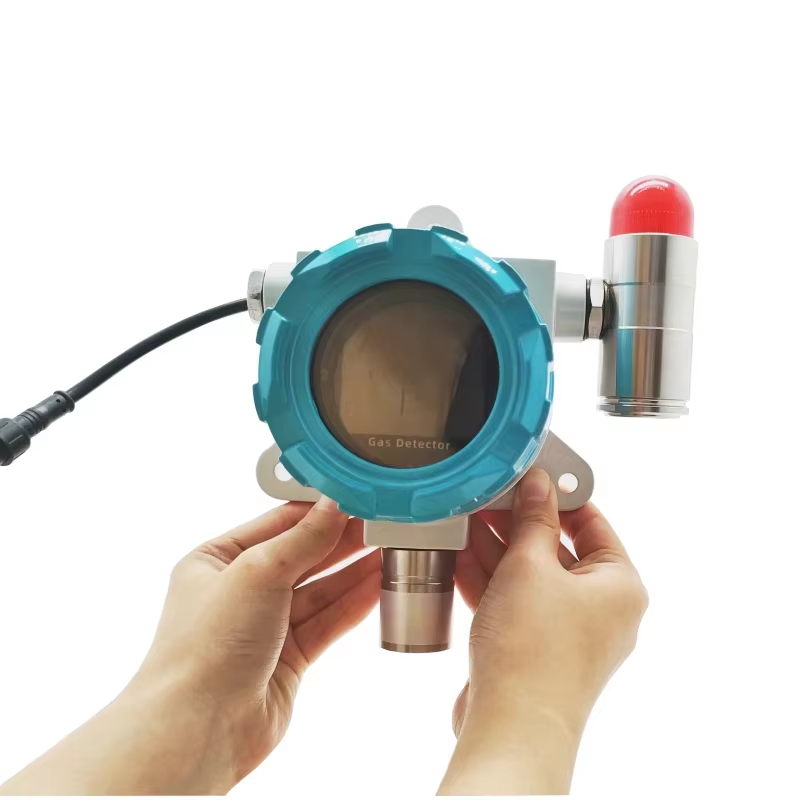Here is a summary of relevant news and typical cases regarding the application of gas sensors in Saudi Arabia.
As a global energy and industrial powerhouse, Saudi Arabia’s application of gas sensors is becoming increasingly widespread and intelligent, driven by its Vision 2030. The primary applications are concentrated in the following areas:
1. Oil, Gas, and Petrochemical Industry
This is the most traditional and core area for gas sensor applications in Saudi Arabia.
- Case: Smart Oil Fields and Plant Safety
- Background: Saudi Aramco has deployed tens of thousands of gas sensors across its oil fields, refineries, and petrochemical facilities throughout the country.
- Application: These sensors continuously monitor concentrations of combustible gases (LEL), Hydrogen Sulfide (H₂S), Carbon Monoxide (CO), and Oxygen (O₂). Upon detecting a leak or dangerous concentration, the system immediately triggers alarms and can automatically activate ventilation systems or shut down parts of the production process to prevent fires, explosions, and poisoning incidents.
- Recent Developments: In recent years, Saudi Aramco has been integrating IoT technology and wireless gas sensor networks into its “Smart Oil Fields” projects, enabling predictive maintenance and remote real-time monitoring, significantly enhancing safety and operational efficiency.
2. Urban Safety and Public Environmental Monitoring
With rapid urbanization, the demand for monitoring public environmental safety is surging.
- Case: Tunnel/Underground Facility Monitoring in Riyadh and Jeddah
- Background: Major Saudi cities have extensive road tunnels, underground parking facilities, and large public buildings (such as shopping malls and airports).
- Application: Fixed gas detection systems are installed in these confined or semi-confined spaces, primarily monitoring Carbon Monoxide (CO), Nitrogen Oxides (NOx) from vehicle emissions, and combustible gas concentrations. When levels exceed standards, ventilation is automatically enhanced to ensure public health and safety.
- Recent Developments: With the launch and operation of the Riyadh Metro system, gas monitoring systems within metro stations and tunnels have become critical safety infrastructure.
3. Water Treatment and Environmental Protection
In water-scarce Saudi Arabia, ensuring the safety of the water treatment process is crucial.
- Case: Toxic Gas Monitoring in Wastewater Treatment Plants
- Background: The wastewater treatment process produces toxic and explosive gases such as Hydrogen Sulfide (H₂S), Methane (CH₄), and Ammonia (NH₃).
- Application: Large wastewater treatment plants in cities like Jeddah and Dammam widely use fixed and portable gas detectors to protect workers from exposure risks and to monitor the operation of biogas recovery and utilization systems.
- Recent Developments: Saudi Arabia’s Ministry of Environment, Water, and Agriculture has strengthened regulations for industrial wastewater treatment, prompting companies to install more advanced gas monitoring equipment.
4. Construction and Residential Sector
Emerging “smart city” projects are driving the application of gas sensors in the civilian sector.
- Case: NEOM Future Cities and Smart Homes
- Background: Future new cities under construction in Saudi Arabia, such as NEOM and the Red Sea Project, are centered on being smart and sustainable.
- Application: In these projects, gas sensors are integrated into Building Automation Systems and smart homes for:
- Kitchen Safety: Monitoring for natural gas leaks.
- Garage Safety: Monitoring Carbon Monoxide (CO).
- Indoor Air Quality (IAQ): Monitoring Carbon Dioxide (CO₂) and Volatile Organic Compounds (VOCs), and automatically linking with fresh air systems to regulate indoor air.
- Recent Developments: NEOM’s promotional materials frequently mention the use of advanced sensor networks to create a safe, healthy, and efficient living environment.
Recent News and Trends
- Stricter Industrial Safety Regulations: The Saudi government continues to tighten regulations for workplace safety, mandating that all industrial sites dealing with hazardous gases must be equipped with properly calibrated gas detection equipment. This directly stimulates the growth of the gas sensor market.
- Localization and “Vision 2030″: As part of Vision 2030, Saudi Arabia encourages technology localization. Several internationally renowned gas detection instrument manufacturers (e.g., Honeywell, MSA) have established branches or partnered with local companies in Saudi Arabia to provide sales, calibration, and maintenance services, with some even considering local manufacturing.
- Technology Upgrades: There is a transition from traditional catalytic bead and electrochemical sensors to more precise and longer-lasting Infrared (IR) and Tunable Diode Laser Absorption Spectroscopy (TDLAS) technologies, especially for hydrocarbon gas monitoring. Furthermore, using drones equipped with mobile gas sensors for large-area surveying and leak detection has become an emerging application for companies like Aramco.
- Major Event Security: During large international sports and cultural events like the Jeddah Season and Diriyah Season, organizers deploy temporary gas monitoring points at venues and crowded areas to respond to potential emergencies and ensure public safety.
Summary
The application of gas sensors in Saudi Arabia is in a period of rapid development and upgrading. The main drivers are:
- Inherent Industrial Demand: A massive energy and industrial base provides a fertile ground for applications.
- National Strategy Push: Urbanization, smartization, and social modernization under “Vision 2030.”
- Increased Safety and Environmental Awareness: Rising requirements for personnel safety and environmental protection.
- Complete set of servers and software wireless module, supports RS485 GPRS /4g/WIFI/LORA/LORAWAN
For more gas sensor information,
please contact Honde Technology Co., LTD.
Email: info@hondetech.com
Company website: www.hondetechco.com
Tel: +86-15210548582
Post time: Oct-22-2025


